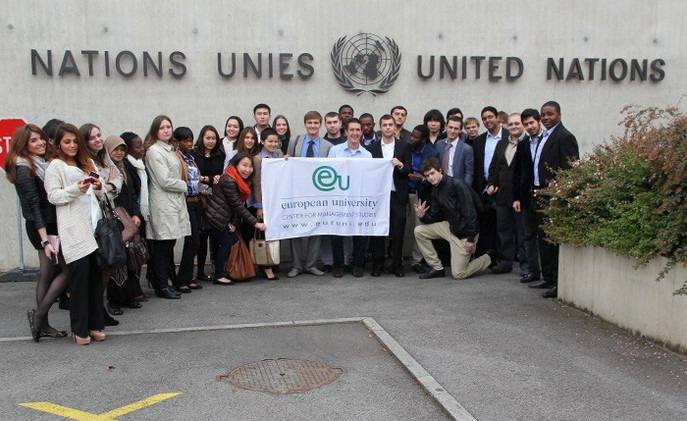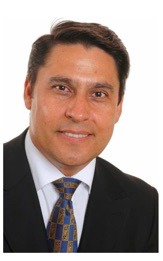

After talking to Anne-Claude Lambelet, and hearing about how intercultural sensitivity is taught in the workplace, we decided to see how the institutions of higher learning teach this important subject. In Geneva, there are a number of international universities with students from all over the world. Some of these students will end up working for international organisations or multinationals based in Geneva, while others will be moving back to their countries of origin. To discuss how the universities prepare their students for today’s multicultural job market, we contacted Dr. Jon-Hans Coetzer, Academic Dean and full-time intercultural sensitivity teacher at the European University.
Who is Jon-Hans Coetzer?
 Dr. Jon-Hans Coetzer is originally from South Africa. He joined the International Committee of the Red Cross in the late 1980s, making him the first South African to join the organisation and one of the first non-Swiss delegates.
Dr. Jon-Hans Coetzer is originally from South Africa. He joined the International Committee of the Red Cross in the late 1980s, making him the first South African to join the organisation and one of the first non-Swiss delegates.
While at the ICRC, he found their unique way of dealing with humanitarian issues to be of great interest. “We were taught how to reach out to the local communities in the areas where we were working," he remembers. "The ICRC is not a court that can give sanctions and they are not armed, so the only thing they have is their moral authority which has to remain unquestionable.”
This is where he was first confronted with, and became a proponent of, the idea of intercultural sensitivity. They were basically taught that no matter how sophisticated or simple the person facing them was, they could always find common ground. That, insists Coetzer, is where to start the relationship and build on it from there.
When he left the ICRC, Coetzer went on to do a doctorate in diplomacy. He wanted to learn what made diplomats unique and why they seemed different from other professionals, considering that they have to deal with sensitive multi-national issues.
“When you think about it, Diplomats are very interesting people. They are unique in every aspect of their work: they have to negotiate and know what to expect from the other side of the negotiation. For me, this is really fascinating.” Coetzer eventually joined the European University as an Academic Dean and full-time faculty member.
Intercultural exposure
“Working with different people has made me a different person. With every move I made, living in different countries, I've had to adapt to the culture and still keep my own culture.” For Coetzer, intercultural sensitivity is not about changing or compromising, it is more about developing different professional cultures. He had to decipher the “host” culture, pick out what he found to be the best of each culture, and use it to help him to fit in with his surroundings without losing himself in the process.
What is the role of the schools in preparing students for intercultural sensitivity?
According to Coetzer, "Students must be ready for a highly varied market. It is important for students to realise that they will be dealing with people from all over the world, both as colleagues and as clients. A school has to be in a position to prepare its student for a world that has people from different cultures, and different needs for different job markets. It is not enough today to just have a degree. It is also important to be flexible, able to work in different areas, and to have the relevant social and professional skills."
During the financial crisis, when an executive from a well-known watch company was asked if the economic crisis would affect sales, he answered that if a client really wanted that particular watch, the cost was not an issue. This answer, while it might be true, could be taken badly by some people because it may sound arrogant.
Coetzer believes that students should learn it can be easy to alienate clients by assuming that everyone thinks the same. Before, in the working world, some products had only one market. However, there are now emerging markets. A product that is doing well in Europe might not be as appealing in South America, Asia or Africa. To attract these markets, it might just be a question of changing the packaging or the advertising strategy, to be more in line with that particular culture.
Who is most sensitive to Intercultural Sensitivity?
 At the European University some students have travelled a lot and have experienced different cultures. Some have not had the same chance to travel and experience what other cultures have to offer. However, the students are all taught in the same manner.
At the European University some students have travelled a lot and have experienced different cultures. Some have not had the same chance to travel and experience what other cultures have to offer. However, the students are all taught in the same manner.
There are always students who are more eager to learn that the acceptance of different cultures depends on the student. Coetzer believes that stereotypes play a very negative role in integration. The fact that some feel that they have to work twice as hard to achieve the same thing as others because of where they come from is common, but unfounded. As Coetzer puts it, “Everyone should work at the same level and be judged according to results. If you have to worry about what others think about you, it will mean there are different criteria for judging employees, and this is not fair to the minority.”
While it is good for employees to be taught intercultural sensitivity at the work place, institutes of higher learning must also be responsible for teaching these skills. Indeed, students will soon join the workforce and quickly be confronted with issues where intercultural skills will be useful, if not necessary.
Coetzer concluded by saying that "Today, intercultural understanding and intercultural competence are more important than ever. They make it possible for us to address the root causes of some of the most virulent problems of today’s societies: misunderstandings across cultural, socio-cultural, ethnic and other lines, discrimination, racism, hate speech and so on."
It seems clear that there is a real urgency –in many aspects of our lives– for education, which can help citizens live together in our diverse societies. For this reason, we all need to develop intercultural competence. The ability to understand each other across all types of cultural barriers is a fundamental prerequisite for making our diverse democratic societies work.
Very interesting subject. In a city as mutlicultural as Geneva, dealing with colleagues and clients from differents nationalities is unavoidable, which makes it vital for all of us to develop intercultural communication skills to increase effective communications with others.
If it's not already done, I'd encourage including managing anxiety and fears as a subject in intercultural sensitivity programs.
I think that across cultures, nations and time, mankind has continued to abuse these basic yet fundamental emotions to create a climate of discrimination, separation and hatred.
Learning to better recognize and reject this kind of manipulation is liberating and allows us to benefit from the advantages of intercultural exchange and coexistence.